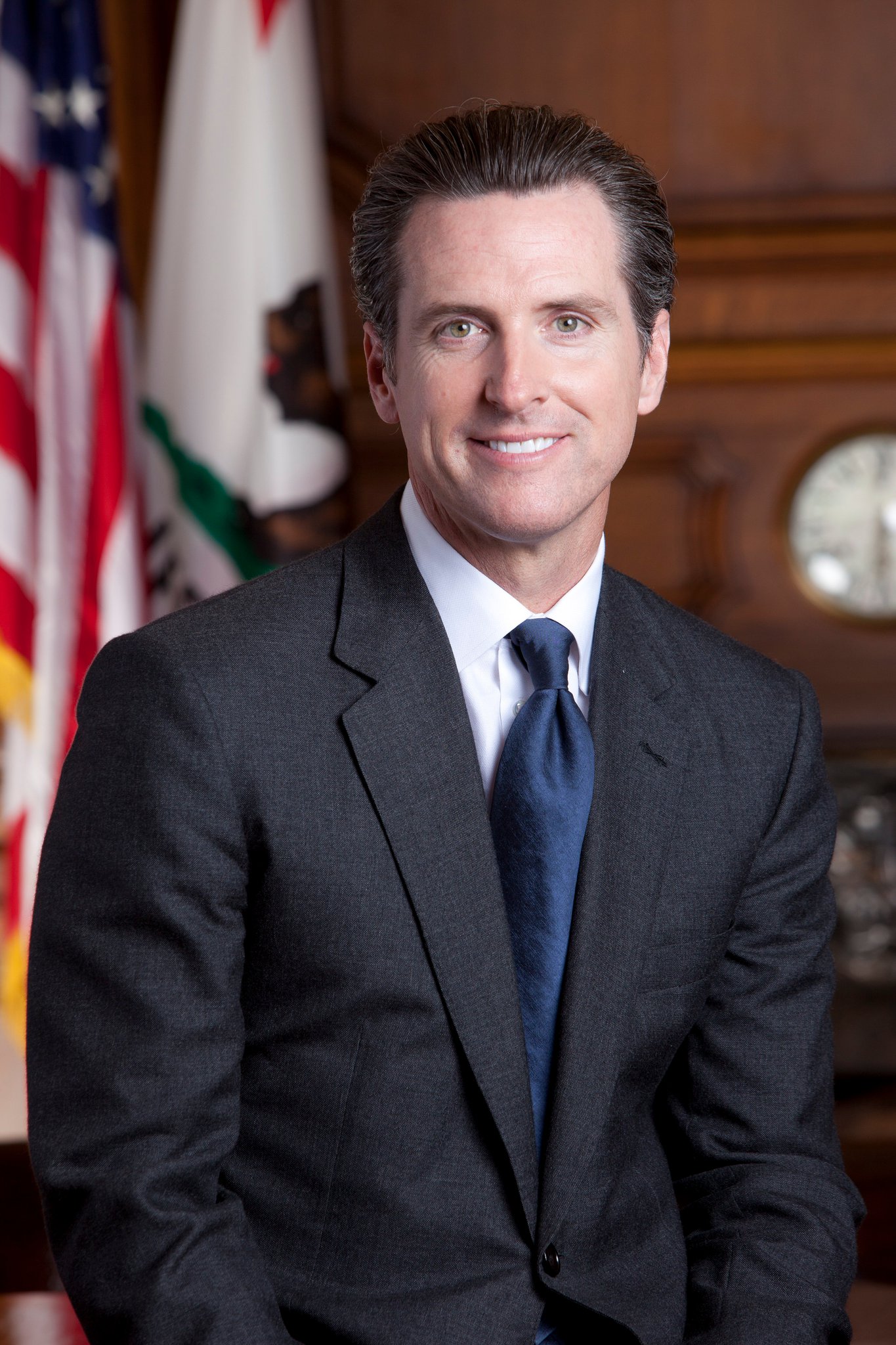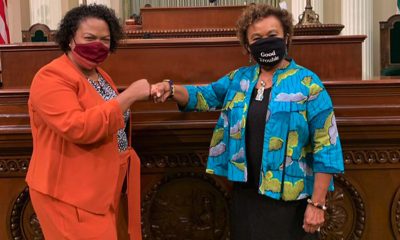Bay Area
Gov. Gavin Newsom Breaks Record With Tens-of-Billions Spending Plan for Public Schools and Community Colleges

On Jan. 10, Gov. Gavin Newsom unveiled his record $222 Billion state budget for 2020-21. The $84 billion he allocated in it for K-12 schools and community colleges represents a historic high level of funding for education in California.
The proposed investment in K-14 education is 3.03 percent or $3.8 billion more than last year. Total K-12 expenditures from all sources in the budget are projected to be $17,964 per pupil.
While state spending on education is at its highest level numerically, Governor Newsom expressed that none of them are “spiking the ball” because education outcomes for many students are not where they should be
“We are making progress, but it is stubborn and slow. We have disparities that are being closed and disparities that are persistent,” said Newsom.
The achievement gap is being closed for Latinx students, students with disabilities, low income students, and African-American students in some metrics. Latinx students narrowed their gap in English language arts scores and high school graduation rates. Students with disabilities made the greatest gains in math and English language arts. African-American students showed the largest graduation rate gain among student groups.
Where progress has been slow has been with students with disabilities, youth in foster care, homeless youth, and African-American students continuing to score below the state standard on English language arts and math tests.
Newsom was very candid in pointing out that 23 low-performing, high-poverty school districts have an over-representation of African-American students.
“It seems self evident that we should focus and concentrate our efforts in those areas in order to address…the substance of the vexing issue as it relates to academic achievement for African-American students.”
“We have to start getting serious and do something about it. We believe the biggest achievement boost is fully prepared teachers,” Newsom said.
The governor is proposing $900.1 million to be invested in workforce investment grants, professional development grants for existing teachers, and teacher recruitment strategies.
“The plan is to build a diverse teaching workforce of stable, prepared professional teachers, including more teachers that look like their students. That’s incredibly important as related particularly to African-American achievement,” Newsom said.
The budget includes $100 million to fund $20,000 stipends for new teachers who choose to teach in high-need schools. This addresses the stubborn fact that high-poverty schools have three times as many unprepared teachers.
$300 million in grants is being made available to close the academic achievement in the lowest-performing districts.
Another $300 million is proposed to expand community schools to address students’ physical and mental health needs by establishing public-private partnerships with community services. The funds will also be used to promote parent engagement.
Special Education in the state of California is in a crisis, according to Newsom. About $900 million dollars is being allocated to increase base funding for Special Ed students, support specific teacher training, fund early diagnosing and intervention and pay for studies on how districts are delivering services to respond to the learning needs of those students.
The budget calls for establishing a new Department of Early Childhood Development to consolidate under one roof the various efforts to implement the governor’s Master Plan for Early Learning and Care, a policy initiative he announced last year.
Newsom is committed to adding 10,000 full-time preschool slots this year and providing universal preschool for all low-income 4-year-olds by the end of next year.
Education leaders’ reactions to the governor’s 2020-21 state budget presentation has been mixed.
“The Governor mentioned that students should have teachers that look more like them, and we couldn’t agree more. We look forward to having the opportunity to invest in our teacher workforce and the pipeline of future teachers coming into the profession, specifically teachers of color and in the fields of science, math, and special education,” Superintendent of Public Instruction Tony Thurmond said.
State Board of Education President Linda Darling Hammond said, “Some students spend the year in classrooms staffed by highly trained, highly prepared teachers. But many others do not.
These disparities are particularly grievous for low-income students of color. The 2020-21 budget investments in educator recruitment and professional development will help place California on solid footing moving forward as we work to build, train and support the kind of high-quality educator workforce all our students need and deserve.”
California Teachers Association President E. Toby Boyd expresses some cynicism.
“Despite California’s economy consistently expanding – now being ranked fifth-largest in the entire world – we have some of the most underfunded schools in the country,” he said. “We rank 39th in the nation in per-pupil funding. We boast the most overcrowded classrooms in the entire country.”
Los Angeles Unified Superintendent Austin Beutner said, “California’s public schools will remain woefully underfunded, especially when compared with the rest of the nation.”
“This budget proposal does not go far enough in funding supports for our most vulnerable students,” Beutner added. “Including students whose families are experiencing homelessness and students with special needs.”
The governor’s presentation begins the formal state budget process. Over the next several months, the California legislature will hold hearings on the budget and special interest groups and the public will have an opportunity to comment on various budget proposals. In mid-May the Governor will release a revised budget plan reflecting changes to spending. The budget will be finalized by the end of June 2020.
Activism
Oakland Post: Week of April 24 – 30, 2024
The printed Weekly Edition of the Oakland Post: Week of April 24 – 30, 2024

To enlarge your view of this issue, use the slider, magnifying glass icon or full page icon in the lower right corner of the browser window. ![]()
Alameda County
DA Pamela Price Stands by Mom Who Lost Son to Gun Violence in Oakland
Last week, The Post published a photo showing Alameda County District Attorney Pamela Price with Carol Jones, whose son, Patrick DeMarco Scott, was gunned down by an unknown assailant in 2018.

Publisher’s note: Last week, The Post published a photo showing Alameda County District Attorney Pamela Price with Carol Jones, whose son, Patrick DeMarco Scott, was gunned down by an unknown assailant in 2018. The photo was too small for readers to see where the women were and what they were doing. Here we show Price and Jones as they complete a walk in memory of Scott. For more information and to contribute, please contact Carol Jones at 510-978-5517 at morefoundation.help@gmail.com. Courtesy photo.
Bay Area
State Controller Malia Cohen Keynote Speaker at S.F. Wealth Conference
California State Controller Malia Cohen delivered the keynote speech to over 50 business women at the Black Wealth Brunch held on March 28 at the War Memorial and Performing Arts Center at 301 Van Ness Ave. in San Francisco. The Enterprising Women Networking SF Chapter of the American Business Women’s Association (ABWA) hosted the Green Room event to launch its platform designed to close the racial wealth gap in Black and Brown communities.

By Carla Thomas
California State Controller Malia Cohen delivered the keynote speech to over 50 business women at the Black Wealth Brunch held on March 28 at the War Memorial and Performing Arts Center at 301 Van Ness Ave. in San Francisco.
The Enterprising Women Networking SF Chapter of the American Business Women’s Association (ABWA) hosted the Green Room event to launch its platform designed to close the racial wealth gap in Black and Brown communities.
“Our goal is to educate Black and Brown families in the masses about financial wellness, wealth building, and how to protect and preserve wealth,” said ABWA San Francisco Chapter President LaRonda Smith.
ABWA’s mission is to bring together businesswomen of diverse occupations and provide opportunities for them to help themselves and others grow personally and professionally through leadership, education, networking support, and national recognition.
“This day is about recognizing influential women, hearing from an accomplished woman as our keynote speaker and allowing women to come together as powerful people,” said ABWA SF Chapter Vice President Velma Landers.
More than 60 attendees dined on the culinary delights of Chef Sharon Lee of The Spot catering, which included a full soul food brunch of skewered shrimp, chicken, blackened salmon, and mac and cheese.
Cohen discussed the many economic disparities women and people of color face. From pay equity to financial literacy, Cohen shared not only statistics, but was excited about a new solution in motion which entailed partnering with Californians for Financial Education.
“I want everyone to reach their full potential,” she said. “Just a few weeks ago in Sacramento, I partnered with an organization, Californians for Financial Education.
“We gathered 990 signatures and submitted it to the [California] Secretary of State to get an initiative on the ballot that guarantees personal finance courses for every public school kid in the state of California.
“Every California student deserves an equal opportunity to learn about filing taxes, interest rates, budgets, and understanding the impact of credit scores. The way we begin to do that is to teach it,” Cohen said.
By equipping students with information, Cohen hopes to close the financial wealth gap, and give everyone an opportunity to reach their full financial potential. “They have to first be equipped with the information and education is the key. Then all we need are opportunities to step into spaces and places of power.”
Cohen went on to share that in her own upbringing, she was not guided on financial principles that could jump start her finances. “Communities of color don’t have the same information and I don’t know about you, but I did not grow up listening to my parents discussing their assets, their investments, and diversifying their portfolio. This is the kind of nomenclature and language we are trying to introduce to our future generations so we can pivot from a life of poverty so we can pivot away and never return to poverty.”
Cohen urged audience members to pass the initiative on the November 2024 ballot.
“When we come together as women, uplift women, and support women, we all win. By networking and learning together, we can continue to build generational wealth,” said Landers. “Passing a powerful initiative will ensure the next generation of California students will be empowered to make more informed financial decisions, decisions that will last them a lifetime.”
-

 Activism4 weeks ago
Activism4 weeks agoOakland Post: Week of March 27 – April 2, 2024
-

 #NNPA BlackPress4 weeks ago
#NNPA BlackPress4 weeks agoCOMMENTARY: D.C. Crime Bill Fails to Address Root Causes of Violence and Incarceration
-

 #NNPA BlackPress4 weeks ago
#NNPA BlackPress4 weeks agoMayor, City Council President React to May 31 Closing of Birmingham-Southern College
-

 #NNPA BlackPress4 weeks ago
#NNPA BlackPress4 weeks agoBeloved Actor and Activist Louis Cameron Gossett Jr. Dies at 87
-

 Community1 week ago
Community1 week agoFinancial Assistance Bill for Descendants of Enslaved Persons to Help Them Purchase, Own, or Maintain a Home
-

 Activism3 weeks ago
Activism3 weeks agoOakland Post: Week of April 3 – 6, 2024
-

 Business1 week ago
Business1 week agoV.P. Kamala Harris: Americans With Criminal Records Will Soon Be Eligible for SBA Loans
-

 Activism2 weeks ago
Activism2 weeks agoOakland Post: Week of April 10 – 16, 2024













































